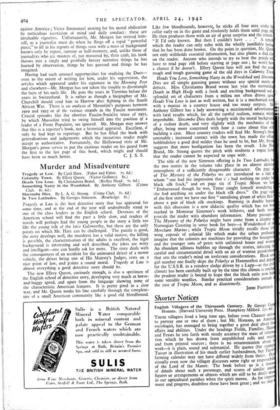Murder and Misadventure
Club. 8s. 6d.)
Tragedy at Law is the best detective story that has appeared for some time, and at the end of the year will undoubtedly stand as one of the class leaders in the English school. Devotees of the American school will find the pace a little slow, and readers of novels will perhaps find the young people in the story a little too like the young folk of the later Galsworthy, but these are the only points on which Mr. Hare can be challenged. The puzzle is good, the story develops well, the murderer has a valid motive, the killing is possible, the characterisation of the adults is excellent, the legal background is interesting and well described, the jokes are witty and intelligent—one can hardly ask for more. The story deals with the consequences of an accident for the uninsured driver of a motor vehicle, the driver being one of His Majesty's Judges, rests on a nice point of law, and paints a round moral. Tragedy at Law is almost everything a. good detective story should be.
The new Ellery Queen, curiously enough, is also a spetimen of the English school of detective story, developing very much at horse- and-buggy speed, and apart from the language showing none of the characteristic American features. It is pretty good in a slow way, and Mr. Queen works his line carefully through the complexi- ties of a small American community like a good old bloodhound Like few bloodhounds, however, he sticks all four aces under collar early on in the game and resolutely holds them until page 1 He then produces them with an air of great surprise and the remark " If I'd only known. But then I couldn't have . . ." A rem which the reader can only echo with the wholly justifiable feel that he has been done brown. On the point in question, Mr. Qu not only withholds essential information, but also plants a dud cl on the reader. Anyone who intends to try to beat the puzzle have to read page 168 before starting at page one ; he won't has a chance if he doesn't. Ellery Queen fans will not find the us rough and tough guessing game of the old days in Calamity Tat
Heads- You Lose, Something Nasty in the Woodshed and Slocomb Dies are all simple guessing games without any special merits defects. Miss Christianna Brand wrote last year the outstand Death in High Heels with a fresh and exciting background and splendid set of characters from a milieu not often drawn u Heads You Lose is just as well written, but it is a mechanical sto with a maniac in a country house and too many corpses. is Anthony Gilbert has a lady answering a matrimonial advertiseme with fatal results which, for all the careful realism, remain wholl improbable. Slocombe Dies deals largely with the moral backgroun of a violent death, and very slightly with the mechanics of th affair, being more concerned with how it came about than w building a case. Most country readers will find Mr. Strong's then untenable ; increased contact with the town has made the villa hobbledehoy a good deal milder than he used to be, but Mr. Stro suggests that more hooliganism has been the result. Like Ali Brand, Mr. Strong queers the pitch with madness a rogue fact that the reader cannot be expected to cope with.
The title of the new Simenon offering is In Two Latitudes, b the two stories in the volume take place in an almost identi atmosphere of a sufficiently disagreeable character; On page of The Mystery of the Polarlys we are introduced to a lady whom " one had the impression that s: .e had nothing on under h black silk frock," and on page six of Tropic Moon we ha " Embarrassed though he was, Timar caught himself wondering she had anything on under the black silk dress." On page ei_ of the first story we have our first " tantalising gleam of white flesh above a pair of black silk stockings. Running in double ham with this obsession is a new didactic quality which has not marked in Monsieur Simenon's work hitherto, and both stop provide the-reader with abundant information. Many passages The Mystery of the Polarlys might have come from a chapter Norwegian Coasting in some book for boys—a Wonderbook of t Merchant Marine ; while Tropic Moon vividly recalls those le wing exposés of colonial life which make the urban proleta imagine that the colonies are machines for providing the bourgeo and the younger sons of peers with unlimited booze and wome An abundant silliness bubbles up through the stories, infecting careful and circumstantial detail with an air of wanton prankish that sets the reader's mind on irrelevant- considerations. Black sa girl number one finally skips the Polarlys at Hammerfest and dep for the U.S.S.R. in a reindeer sledge driven by a Lapp—as the ch climate has been carefully built up by the time this climax is reach the prudent reader is bound to hope that the black satin now hid some sensible woollies. Similar practical considerations intrude the case of Tropic Moon, and as disastrously.
JOHN FAIRFIELD






















 Previous page
Previous page